I don’t know about you, but the last few years have not felt very magical to me. At least in the more contemporary colloquial sense of the word that conjures enchantment, inspiration, and awe.
Sure, there was plenty of trickery performed on our collective mind. First, by the orange master of banality, venality, and grandiosity. The spell he cast on his cabal of red-hatted zealots was designed to leave us in a permanent state of revulsion, and the way to break it was through rejection and resistance.
The pandemic reinforced and deepened our defense mechanisms. As if having a tiny but mighty virus coming to get us wasn’t stressful enough, the invisible nature of the threat was also a gift to the dark artists, who used the uncertainty and confusion to further distract and divide us.
From insurrection to invasion and inflation, from BLM backlash to book bans and bus stunts, from Delta to Dobbs, the hits just kept on coming, granting precious little occasion to ease from our position of recoil. All of it overlaid on the backdrop of the ongoing climate crisis, bubbling up with stark reminders of its existence with intensifying consistency.
However, over the past few months a different energy has been wafting from the long darkness, rising nimbly through the firm ground that has felt impermeable to seeds of hope for so long now. Undoubtedly fanned by collective manifestations of defiance against oppression and disillusion such as the Ukrainians’ refusal to be defeated on the battlefield, Iranian women’s brave fight for their human rights, or Americans’ rejection of the Big Lie at the ballot box coupled with promising legislative successes of the government we did elect, it has transmuted into soft rays of light for each of us to draw from.
This shift in energy came into conscious focus for me on a New Years Day walk through San Francisco Botanical Garden, when a glance down the trunks of the majestic magnolia trees near the restrooms revealed a delightful panoply of sprightly but unlisted visitors.
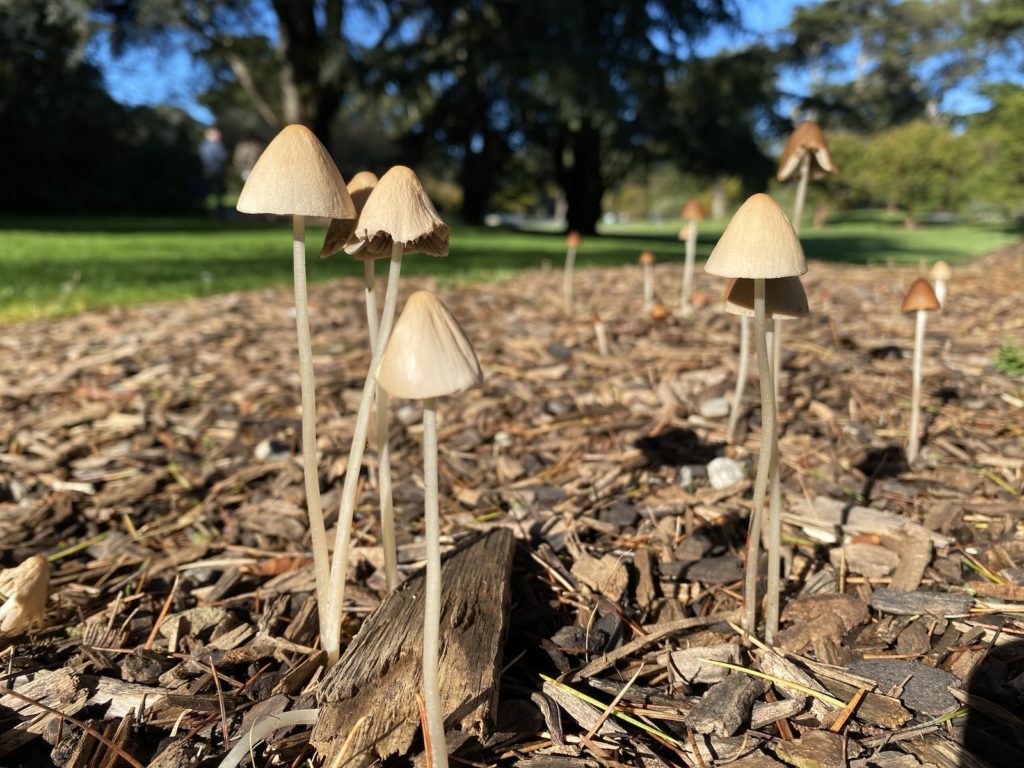
I’ve always rejoiced in the power of underground emergence out of the dark but fertile soil. There is something rich, profound, and hopeful in the idea of potential new creations germinating from a place we cannot yet see but perhaps imagine. It takes a leap of faith to envision a fully grown garden when all you have to go by are scattered seeds in the ground.
And mushrooms are even more miraculous — they can shoot out of the ground overnight, in places both expected and unexpected, in shapes and appearances too multitudinous to put into words. There are currently about 14,000 identified types of mushrooms, but mycologists estimate that there are about 150,000 species of macroscopic fungal fruiting bodies out of 1–2 million species of fungi.
That is a lot of emergence that has yet to unfold.
As I was standing there admiring the slender fungal apparitions glistening from the rain-soaked soil in the morning sun, I was in awe both of what was being revealed but also of how the source of the revelation stayed invisible to the human eye. I knew that somewhere below my feet, this joyful troupe of mushrooms dancing on the wood chips was feeding from a mass of fine filaments of living cells called mycelia, the largest biological entities on the planet that intersect and permeate through one another in an underground network that is the foundation of all soils.
The idea that what lies hidden beneath could bring to light millions of different manifestations tickles me to no end. If you apply it to human consciousness — and why wouldn’t you unless you believe we’re not of this earth? — it means that we too have an almost boundless subterranean reservoir of ideas to draw from and express into the world. As mycologist and author Paul Stamets posits, the vast but barely explored kingdom of mycelia may be the essential wiring of the Gaian consciousness, the Earth’s natural Internet of sorts.


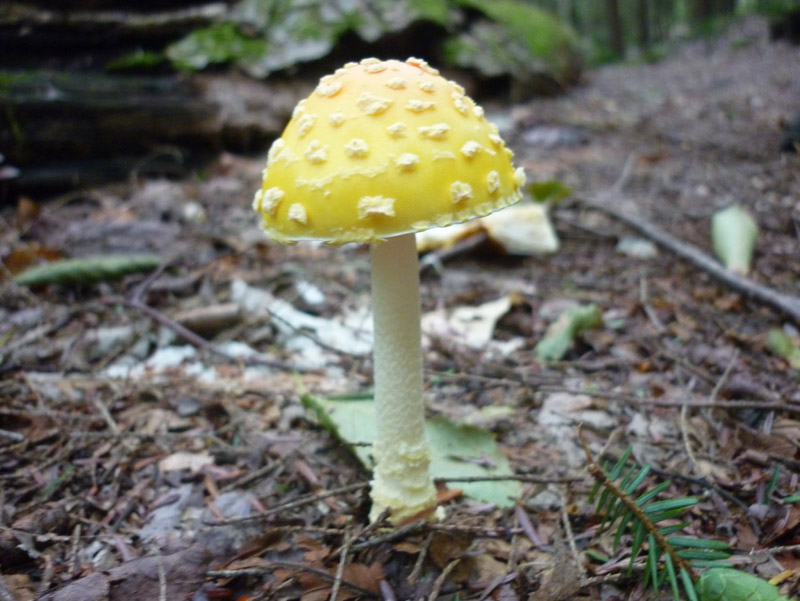
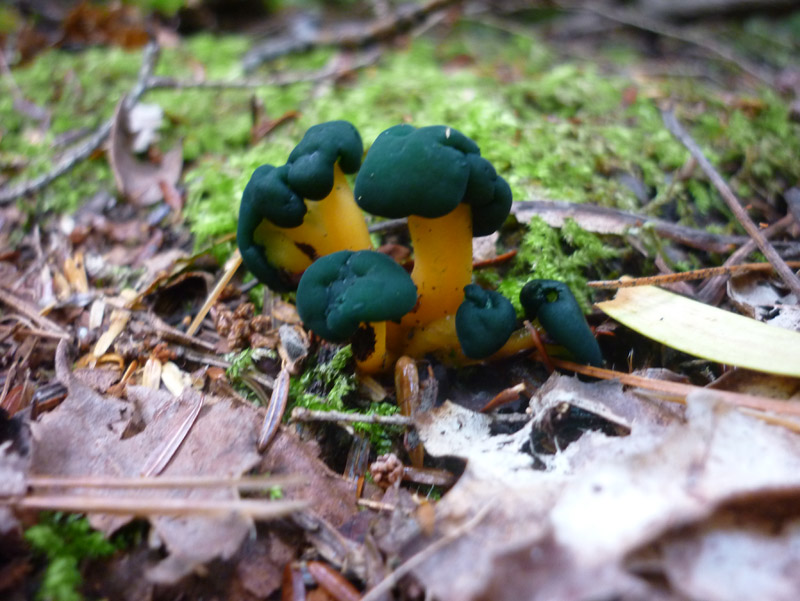
Personally, I have speculated whether mycelia could be a direct line to God, or at least mimic a divine information system. But whatever terminology one wishes to ascribe to this ecological phenomenon, it is lush with metaphorical moss to provide a soft landing in the freewheeling pursuit of verbalizing our human quest for transforming darkness into light, creating something out of nothing, finding meaning in the unspeakable.
This is the mindset I was in when I opened one of the books that evening I had been handed by a good friend who was cleaning out his shelves a few days earlier: How to Change Your Mind: What the New Science of Psychedelics Teaches Us About Consciousness, Dying, Addiction, Depression, and Transcendence.
Written by Michael Pollan, author of such seminal works as The Botany of Desire, The Omnivore’s Dilemma, and In Defense of Food, How to Change your Mind chronicles the history of psychedelic drugs and their recent renaissance as not only a treatment for all kinds of mental illnesses but also a legitimate therapeutic for the sort of spiritual alienation so many people in our modern world are experiencing. Naturally psilocybin, the main psychoactive compound found in more than 200 species of fungi that enables our mind to dislodge from its ego container and explore existence from a non-binary cosmic state, features prominently in the book.
While I can’t help but view the sudden appearance of How to Change Your Mind on top of my (rather) lengthy stack of books as a subtle but intentional tag on the rope from the other side, my rumination here is not meant to become a book review or a reflection on my own past experiences with psychedelics. So let me just point to a linguistic nugget that jumped out at me as I was devouring the first chapter, aptly titled “A Renaissance” to help put some metaphorical meat on the “emergence” theme of this post. On page 38, as he is describing the earnest character of Bob Jesse, one of the hidden movers and shakers in the psychedelics renaissance, Pollan recounts Jesse’s response to his offhand mention of the term “recreational use” in regard to psychedelics.
“Maybe we need to reexamine that term. Typically, it is used to trivialize an experience. But why? In its literal meaning, the word ‘recreational’ implies something decidedly nontrivial.”
Yes! What could be more sacred and profound than RE-CREATION? At its core, re-creation offers so much more than a prepackaged escape from the drudgery of our daily lives it is commonly associated with: A new entry into that which makes us whole. A return to a place of all possibility. The act of once again submerging ourselves into the source from whence we emerged.
In the same linguistic vein, “emergence” is another concept whose mystical potential for active transformation has been blunted by the reactive meaning of the more commonly used emergencY, which we are bombarded with on the nightly news. The question though for me is not so much whether we should choose the imbued energy of the “e” or the “y”, but whether we can hold both at once. Especially in the times we live in, with more emergencies to grapple with than our monkey mind could possibly process, it is the perfect opportunity to connect what is to what could be, to broaden our world from the one we know to the ones we imagine.
As Rebecca Solnit wrote in her seminal work on finding meaning and purpose in an uncertain world, Hope in the Dark:
Inside the word “emergency” is “emerge”; from an emergency new things come forth. The old certainties are crumbling fast, but danger and possibility are sisters.
My mushroom encounters here at the turn of the calendar year feel like just the right kind of prompts to dip a little deeper into the pool and see what’s down there. To emerge from the darkness and re-create. What this will look like for me personally, I don’t yet know. But the message I take is that I don’t need to know, but rather trust the process of finding out. This kind of fungal flow feels like a true gift from the gods, and we don’t even need the psilocybin to receive its magic.

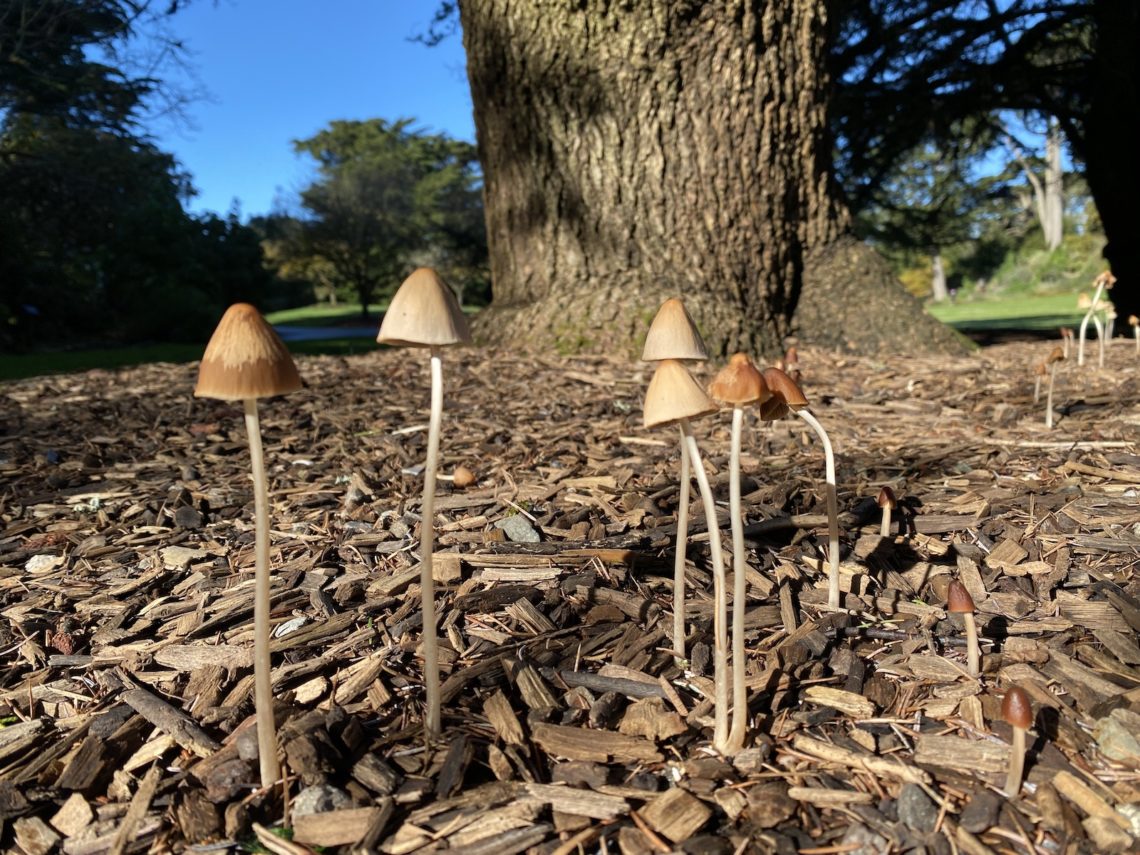
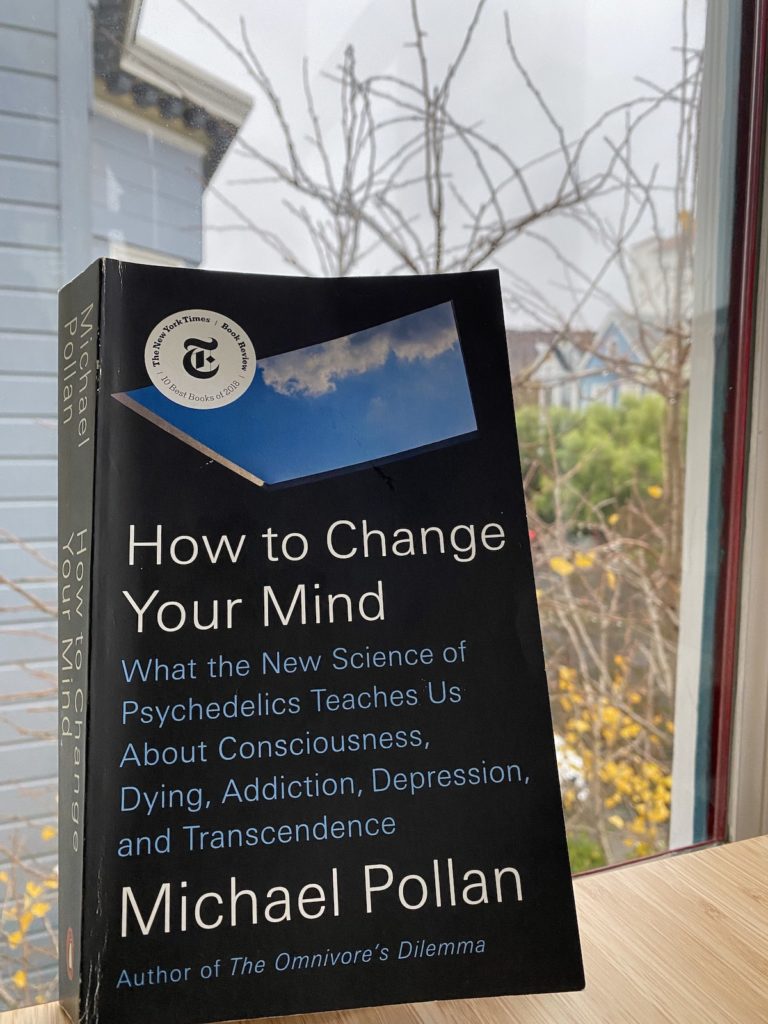






Thanks, Sven – interesting that nowadays only the extremes seem to come close to satisfying people. Makes me curiouser than I would have thought about what will engage people in, say, 10000 CE or even 2200 CE. I have been telling friends and family this past year has assured me that we are approaching the emergence of another one of the very few cultural epochs(?) witnessed by our species: after fire, then perhaps formalized “religion”, urbanization & agriculture, universal electrification, mechanization – industrialization, global transportation, telecommunication, data + digital ‘intelligence’ I think it will be psychoemotional awareness + usage.
Interesting thoughts, Bill. I think you’re on to something with the “psychoemotional awareness + usage” as our next evolutionary stage. Not sure we can get there in time to eschew the collapse from the heavy industrial armor we’ve needed up until now to communicate with each other, but if we don’t envision it we won’t get there. I remember thinking when the internet first became a thing, what if we could leapfrog this clunky, gadget and energy intensive vehicle of global communication and just move straight to the auranet? Perhaps mushrooms could get us there?
Sven: When your blog post notification hit my inbox, I put it aside, wanting to dedicate my full attention to it, knowing your posts have been sparse over these days of “recoil.” The times have pretty much silenced MY pen, despite explosive emotions pulsing through the fingers that hold it. I’m grateful for your expression, as it shifts one’s consciousness (your niche!). Some would say mycelia represents rot. You turn “rot” into “hope” like no other writer I know.
May I suggest another author for you? https://www.joanmaloof.com/books Her work is powerful, too, highlighting the dependent relationship between the underground and the ancient. (Nature’s Temples: The Complex World of Old-Growth Forests)
Thank you so much for your thoughtful and lovely comment, Ruth. It’s certainly true I haven’t been doing as much creative writing lately, partly due to the “recoil” but also I’ve been so busy with my day job as a grant writer for Stand.earth. And it’s funny you should mention old-growth forests and Joan’s book, that has actually been one of my beats at Stand: https://stand.earth/our-work/campaigns/old-growth-forests/
I love the imagery of turning rot into hope you painted. Just like all the forest creatures, we humans (with our big brains!) also have to adapt to the flow of our circumstances. I sure hope that despite your pen being silenced you are finding ways to be fulfilling and fulfilled. And when the ink (ok, the keyboard) returns for you, I will be poised to read about your latest thought evolutions.
Dark artists, recoil, panoply, emergence yet to unfold, manifestations tickle, metaphorical moss, non-binary cosmic state, re-creation, from whence.
Gawd, I love your sense-making and word choice; such concise clarity.
High praise from a sublime song smith!
May find time yet rising to the grace that I cannot fathom
and worship the dust on my seven-year-old atoms.
The slow change of dying is like Theseus’s ship,
if you changed all at once you would cease to exist.